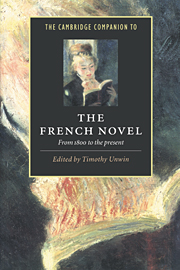Book contents
- Frontmatter
- 1 On the novel and the writing of literary history
- 2 Novels of testimony and the 'invention' of the modern French novel
- 3 Reality and its representation in the nineteenth-century novel
- 4 Women and fiction in the nineteenth century
- 5 Popular fiction in the nineteenth century
- 6 Decadence and the fin-de-siècle novel
- 7 The Proustian revolution
- 8 Formal experiment and innovation
- 9 Existentialism, engagement, ideology
- 10 War and the Holocaust
- 11 From serious to popular fiction
- 12 The colonial and postcolonial Francophone novel
- 13 The French-Canadian novel
- 14 Gender and sexual identity in the modern French novel
- 15 Postmodern Frenchfiction
- General bibliography
- Index
13 - The French-Canadian novel
Published online by Cambridge University Press: 28 May 2006
- Frontmatter
- 1 On the novel and the writing of literary history
- 2 Novels of testimony and the 'invention' of the modern French novel
- 3 Reality and its representation in the nineteenth-century novel
- 4 Women and fiction in the nineteenth century
- 5 Popular fiction in the nineteenth century
- 6 Decadence and the fin-de-siècle novel
- 7 The Proustian revolution
- 8 Formal experiment and innovation
- 9 Existentialism, engagement, ideology
- 10 War and the Holocaust
- 11 From serious to popular fiction
- 12 The colonial and postcolonial Francophone novel
- 13 The French-Canadian novel
- 14 Gender and sexual identity in the modern French novel
- 15 Postmodern Frenchfiction
- General bibliography
- Index
Summary
Although in recent years French-Canadian writers, like their counterparts in other Francophone communities, have been energised by nationalism, the literary development of French-speaking Canada bears only a superficial resemblance to that elsewhere. Its conquest, by the British, goes back well over two centuries, but Canada has been politically independent from Britain since 1867, with Quebec as one of its founding provinces. What has happened there since has been the responsibility of its own citizens; and the fifty thousand French of the mid-eighteenth century, far from being swamped in a flood of English-speaking immigrants, have grown to seven millions. Montreal, a small, largely English-speaking town in the early nineteenth century, is now a vast metropolis, by far the biggest Francophone city outside Paris.
Formerly the term 'French-Canadian' was used to cover all Francophone Canadian literature; since the 1960s, it has been superseded by 'Quebec', 'québécois'. In some ways this term is less clear, even tendentious, since it sidelines writers from outside Quebec, such as Gabrielle Roy, from Manitoba, often considered Canada's greatest Francophone novelist, or Antonine Maillet, born in New Brunswick, the only Canadian Goncourt prizewinner. 'Québécois' also excludes Anglophone writers who draw their inspiration from the 'belle province', of whom the best-known is Mordecai Richler. Be this as it may, in French Canada we find the most vigorous of all non-French Francophone literary cultures, and from its rich stock of novels only a few salient titles can be cited. The present essay is of course written from the viewpoint of an interested Anglophone observer.
- Type
- Chapter
- Information
- The Cambridge Companion to the French NovelFrom 1800 to the Present, pp. 214 - 222Publisher: Cambridge University PressPrint publication year: 1997

